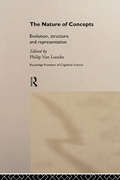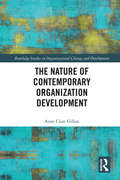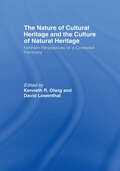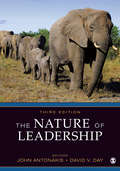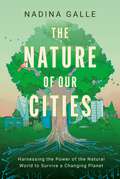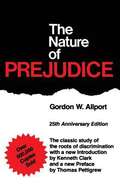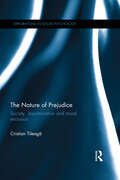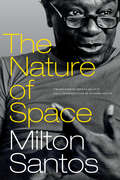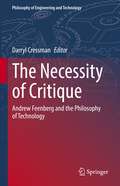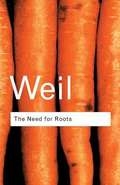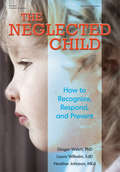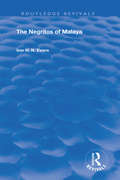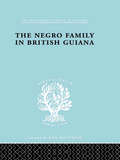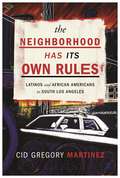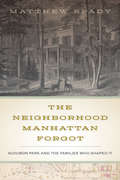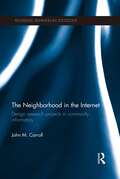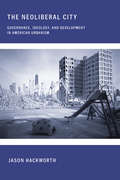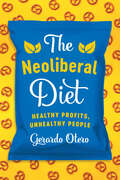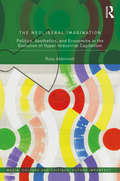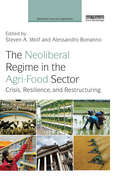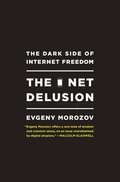- Table View
- List View
The Nature of Concepts: Evolution, Structure and Representation (Frontiers of Cognitive Science #Vol. 2)
by Philip Van LoockeThe Nature of Concepts examines a central issue for all the main disciplines in cognitive science: how the human mind creates and passes on to other human minds a concept. An excellent cross-disciplinary collection with contributors including Steven Pinker, Andy Clarke and Henry Plotkin.
The Nature of Contemporary Organization Development (Routledge Studies in Organizational Change & Development)
by Anne Clare GillonThe nature of contemporary Organisation Development (OD) is often written about by both scholars and practitioners, yet there is little evidence of these descriptions (or debates on key issues) having been based on reliably collected data. This book compares academic and practitioner perspectives on the profession of OD in the UK and how it has evolved over four decades. The research which informs this book was designed to investigate similarities and differences in the perspectives between these two communities. Where practitioners and academics views varied in the data, reasons for this are explored in this book, through the theory lens of Institutionalism, Fashions, Fads and the Dissemination of Management Ideas. The empirical data in how OD has evolved in the UK in the underpinning research to this text was gathered through content analysis of job advertisements from over a four-decade period. This provided information on changes in the magnitude in the take up of the profession in the UK as well as significant developments in the content of the job roles over the period. It will not come as a surprise to find that American thinking dominates in OD as it does in many other domains of management. What is a surprise is the extent to which OD practice in the UK is so very different from what the academics tell us it is. This book also identifies the extent to which institutional theory is at play in the development of professions; with agency is a driver in shaping professions. This manifests itself in terms of the perceived interests of what will give leverage for success in practitioner and academic careers. The Nature of Contemporary Organization Development is key reading for researchers, scholars an practitioners alike of Organizational change and development, organizational studies, management philosophy and related disciplines
The Nature of Cultural Heritage, and the Culture of Natural Heritage
by Kenneth R. Olwig and David LowenthalThe idea that the heritage of nature is fundamentally cultural is provocative to many, but it is becoming increasingly accepted in the context of heritage preservation. It is argued here that a person’s perspective on natural vs. cultural heritage as a contested patrimony is, to some extent, governed by one’s intellectual and geographical position. In discourses influenced by the natural sciences culture is a heritage of nature, whereas in those deriving from the humanities and social sciences, nature is defined socio-culturally. There is also, however, a geographical dimension to how one looks at the nature culture relation. From at least the time of Aristotle, the North has been identified with a cultural heritage thought to derive from the northern natural environment. It was no longer culture, as represented by the architectural monuments of the South, but the natural landscape that provided the measure for both natural and cultural heritage, as the natural landscape and its ecosystems were put in focus. This essay provides a contemporary picture of the long-standing contestation between natural and cultural heritage that provided the basis for the northern perspective taken in these essays.This book was previously published as a special issue of The International Journal of Heritage Studies.
The Nature of Leadership
by John Antonakis David V. DayThe Nature of Leadership includes the most important areas of leadership in a concise and integrated manner with impactful contributions from the most prominent leadership scholars and researchers in the field. Editors John Antonakis and David V. Day provide an in-depth exploration of the major schools of leadership as well as emerging perspectives. This fully-updated text includes new material examining followership, gender, power, identity, culture, and entrepreneurial leadership. The text concludes by unpacking philosophical and methodological issues in leadership such as ethics and corporate social responsibility. The Third Edition has been fully revised to be more accessible and student friendly with new vignettes, examples, statistics, and recommended case studies and TED Talk-type videos to illuminate the essence of leadership. "This is the definitive higher-level textbook on leadership and leaders written by key scholars. It provides a broad collection of engaging texts for both students and researchers." –Oliver Mallett, Durham University Business School
The Nature of Leadership
by John Antonakis David V. DayThe Nature of Leadership includes the most important areas of leadership in a concise and integrated manner with impactful contributions from the most prominent leadership scholars and researchers in the field. Editors John Antonakis and David V. Day provide an in-depth exploration of the major schools of leadership as well as emerging perspectives. This fully-updated text includes new material examining followership, gender, power, identity, culture, and entrepreneurial leadership. The text concludes by unpacking philosophical and methodological issues in leadership such as ethics and corporate social responsibility. The Third Edition has been fully revised to be more accessible and student friendly with new vignettes, examples, statistics, and recommended case studies and TED Talk-type videos to illuminate the essence of leadership. "This is the definitive higher-level textbook on leadership and leaders written by key scholars. It provides a broad collection of engaging texts for both students and researchers." –Oliver Mallett, Durham University Business School
The Nature of Our Cities: Harnessing the Power of the Natural World to Survive a Changing Planet
by Nadina GalleIn the tradition of Elizabeth Kolbert and Michael Pollan, The Nature of Our Cities is a stirring exploration of how innovators from around the world are combining urban nature with emerging technologies, protecting the planet’s cities from the effects of climate change and safeguarding the health of their inhabitants.We live in an age when humanity spends 90% of its time indoors, yet the nature around us—especially in America’s cities—has never been more vital. This distancing from nature has sparked crises in mental health, longevity, and hope for the next generation, while also heightening the risks we face from historic floods, heatwaves, and wildfires. Indeed, embracing nature holds untapped potential to strengthen and fortify our cities, suburbs, and towns, providing solutions spanning flood preparation, wildfire management, and promoting longevity. As ecological engineer Dr. Nadina Galle shows in The Nature of Our Cities nature is our most critical infrastructure for tackling the climate crisis. It just needs a little help. A fellow at MIT’s Senseable City Lab and selected for Forbes’ 30 under 30 list, Galle is at the forefront of the growing movement to fuse nature and technology for urban resilience. In THE NATURE OF OUR CITIES, she embarks on a journey as fascinating as it is pressing, showing how scientists and citizens from around the world are harnessing emerging technologies to unlock the power of the natural world to save their cities, a phenomenon she calls the “Internet of Nature.” Traveling the globe, Galle examines how urban nature, long an afterthought for many, actually points the way toward a more sustainable future. She reveals how technology can help nature navigate this precarious moment with modern advances such as:Laser-mapping that identifies at-risk neighborhoods to fight deadly health disparitiesA.I.-powered robots that prevent wildfires from reaching urban areasIntelligent water gardens that protect cities from floods and hurricanesAdvanced sensors that achieve 99% tree survival in dry, hot summers Optimistic in spirit yet pragmatic in approach, Galle writes persuasively that the future of urban life depends on balancing the natural world with the technology that can help sustain it. By turns clear-eyed and lyrical, THE NATURE OF OUR CITIES marks the emergence of an invigorating, prescient new talent in nature writing.
The Nature of Prejudice Unabridged 25th Anniversary Edition
by Gordon W. AllportWith profound insight into the complexities of the human experience, Harvard psychologist Gordon Allport organized a mass of research to produce a landmark study on the roots and nature of prejudice. First published in 1954, The Nature of Prejudice remains the standard work on discrimination. Now this classic study is offered in a special unabridged edition with a new introduction by Kenneth Clark of Columbia University and a new preface by Thomas Pettigrew of Harvard University.Allport's comprehensive and penetrating work examines all aspects of this age-old problem: its roots in individual and social psychology, its varieties of expression, its impact on the individuals and communities. He explores all kinds of prejudice-racial, religious, ethnic, economic and sexual-and offers suggestions for reducing the devastating effects of discrimination.The additional material by Clark and Pettigrew updates the social-psychological research in prejudice and attests to the enduring values of Allport's original theories and insights.
The Nature of Prejudice: Society, discrimination and moral exclusion (Explorations in Social Psychology)
by Cristian TileagăThis book offers a critical synthesis of social psychology’s contribution to the study of contemporary racism, and proposes a critical reframing of our understanding of prejudice in European society today. Chapters place a special emphasis on the diversity and intensity of prejudices against Romani people in a liberal, progressive, decent, enlarged Europe. Chapters ask how we can reconcile the European creed of law, justice and freedom for all, with social and political practices that exclude and degrade Romani people. <P><P> This volume addresses the need for a deeper recognition of societal foundations of ideologies of moral exclusion, and calls for a closer and more thorough investigation of prejudices that stem from the societal transformation, diminution or denial of moral worth of human beings (and the various conditions and contexts that create and promote it). By opening new intellectual dialogues, the book reinvigorates a renewed social psychology of racism, and creates a broader foundation for the exploration of the various, active paradoxes at the heart of the social expression of prejudice in liberal democracies. <P><P> The Nature of Prejudice is essential reading for academics, researchers and postgraduate students interested in both the quantitative and qualitative study of discrimination, inequality and social exclusion.
The Nature of Space (Latin America in Translation)
by Milton SantosIn The Nature of Space, pioneering Afro-Brazilian geographer Milton Santos attends to globalization writ large and how local and global orders intersect in the construction of space. Santos offers a theory of human space based on relationships between time and ontology. He argues that when geographers consider the inseparability of time and space, they can then transcend fragmented realities and partial truths without trying to theorize their way around them. Based on these premises, Santos examines the role of space, which he defines as indissoluble systems of objects and systems of actions in social processes, while providing a geographic contribution to the production of a critical social theory.
The Nature of Supreme Court Power
by Matthew E. K. HallFew institutions in the world are credited with initiating and confounding political change on the scale of the United States Supreme Court. The Court is uniquely positioned to enhance or inhibit political reform, enshrine or dismantle social inequalities, and expand or suppress individual rights. Yet despite claims of victory from judicial activists and complaints of undemocratic lawmaking from the Court's critics, numerous studies of the Court assert that it wields little real power. This book examines the nature of Supreme Court power by identifying conditions under which the Court is successful at altering the behavior of state and private actors. Employing a series of longitudinal studies that use quantitative measures of behavior outcomes across a wide range of issue areas, it develops and supports a new theory of Supreme Court power. Matthew E. K. Hall finds that the Court tends to exercise power successfully when lower courts can directly implement its rulings; however, when the Court must rely on non-court actors to implement its decisions, its success depends on the popularity of those decisions. Overall, this theory depicts the Court as a powerful institution, capable of exerting significant influence over social change.
The Necessity of Critique: Andrew Feenberg and the Philosophy of Technology (Philosophy of Engineering and Technology #41)
by Darryl CressmanThe essays in this edited collection are inspired by Andrew Feenberg’s philosophy of technology. Feenberg is the leading critical theorist of technology working today, combining the critical traditions of Karl Marx, Martin Heidegger, Georg Lukáacs, and Herbert Marcuse with empirical methods from science & technology studies (STS) and media studies.Divided into three parts, these contributions from philosophers, media theorists, design theorists, and STS scholars, reflect the relevancy of Feenberg's philosophy for making sense of our technically mediated society. This collection appeals to students and researchers interested in the philosophy of technology, critical theory, smart cities, big data, AI, and algorithmic culture.
The Need for Roots: Prelude to a Declaration of Duties towards Mankind
by Simone Weil Arthur WillisHailed by Andre Gide as the patron saint of all outsiders, Simone Weil's short life was ample testimony to her beliefs. In 1942 she fled France along with her family, going firstly to America. She then moved back to London in order to work with de Gaulle. Published posthumously The Need for Rootswas a direct result of this collaboration. Its purpose was to help rebuild France after the war. In this, her most famous book, Weil reflects on the importance of religious and political social structures in the life of the individual. She wrote that one of the basic obligations we have as human beings is to not let another suffer from hunger. Equally as important, however, is our duty towards our community: we may have declared various human rights, but we have overlooked the obligations and this has left us self-righteous and rootless. She could easily have been issuing a direct warning to us today, the citizens of Century 21.
The Needs of Strangers
by Michael IgnatieffThis thought provoking book uncovers a crisis in the political imagination, a wide-spread failure to provide the passionate sense of community "in which our need for belonging can be met." Seeking the answers to fundamental questions, Michael Ignatieff writes vividly both about ideas and about the people who tried to live by them-from Augustine to Bosch, from Rousseau to Simone Weil. Incisive and moving, The Needs of Strangers returns philosophy to its proper place, as a guide to the art of being human.
The Neglected Child: How to Recognize, Respond, and Prevent
by Ginger Welch Laura Wilhelm Heather JohnsonThe Neglected Child provides everything educators and caregivers need to know to identify and intervene in neglectful situations, while also creating a safe, nurturing, and protective environment for young children. From defining the different types and levels of severity of neglect to establishing suspicion and reporting neglectful situations, this book is filled with helpful information from expert psychologists and educators in the field today. Each chapter includes a brief quiz to assess chapter learning and "Notes from the Field" that represent real-life stories the authors have encountered in their work. The appendices at the end of the text include reproducible handouts, sample statements for parent handbooks, self-assessments for teachers, and important contact information to use when reporting neglect.
The Negritos of Malaya (Routledge Revivals)
by Ivor H. EvansPublished in 1937. This book, written by the well-known authority on the ethnology and archaeology of the Malay Peninsula, presents a compact and detailed account of the Negritos, one of the three paga races of the Peninsula. It brings up to date much of the previous work on this subject, and deals with all aspects of their character and environment. By way of introduction, there is a general description of the geography and development of the Peninsula, together with a discussion of statistics concerning the tribe's distribution, their health, habitat, and territories. The author then examines the various aspects of their everyday life, including social and domestic customs, hunting, agriculture, dress, ornamentation, musical instruments, and art, as well as their religious beliefs and superstitions. The chapters on their weapons are particularly detailed and informative, and the book is supported throughout by useful illustrations. Although many further studies of this area and its people have been made since the first publication of this book in 1937, its methodical and careful documentation has yet to be superseded, and it remains indispensable to all students of anthropology and sociology.
The Negro Family in British Guiana: Family Structure and Social Status in the Villages (International Library of Sociology #Vol. 66)
by Raymond T. SmithThis is Volume IX of eighteen in a collection on the Sociology of Development. Originally published in 1956 and using language of the time, this monologue looks at the family system in Guianese families.
The Neighborhood Has Its Own Rules: Latinos and African Americans in South Los Angeles
by Cid MartinezSouth Los Angeles is often seen as ground zero for inter-racial conflict and violence in the United States. Since the 1940s, South LA has been predominantly a low-income African American neighborhood, and yet since the early 1990s Latino immigrants—mostly from Mexico and many undocumented—have moved in record numbers to the area. Given that more than a quarter million people live in South LA and that poverty rates exceed 30 percent, inter-racial conflict and violence surprises no one. The real question is: why hasn't there been more? Through vivid stories and interviews, The Neighborhood Has Its Own Rules provides an answer to this question. Based on in-depth ethnographic field work collected when the author, Cid Martinez, lived and worked in schools in South Central, this study reveals the day-to-day ways in which vibrant social institutions in South LA— its churches, its local politicians, and even its gangs—have reduced conflict and kept violence to a level that is manageable for its residents. Martinez argues that inter-racial conflict has not been managed through any coalition between different groups, but rather that these institutions have allowed established African Americans and newcomer Latinos to co-exist through avoidance—an under-appreciated strategy for managing conflict that plays a crucial role in America's low-income communities. Ultimately, this book proposes a different understanding of how neighborhood institutions are able to mitigate conflict and violence through several community dimensions of informal social controls.
The Neighborhood Manhattan Forgot: Audubon Park and the Families Who Shaped It
by Matthew SpadyAudubon Park’s journey from farmland to cityscapeThe study of Audubon Park’s origins, maturation, and disappearance is at root the study of a rural society evolving into an urban community, an examination of the relationship between people and the land they inhabit. When John James Audubon bought fourteen acres of northern Manhattan farmland in 1841, he set in motion a chain of events that moved forward inexorably to the streetscape that emerged seven decades later. The story of how that happened makes up the pages of The Neighborhood Manhattan Forgot: Audubon Park and the Families Who Shaped It.With a colorful cast of characters drawn from the upper crust of nineteenth-century New York City, this fully illustrated history peels back the many layers of a rural society evolving into an urban community, enlivened by the people who propelled it forward: property owners, tenants, laborers, and servants. Thoroughly researched through primary and secondary sources, as well as private collections, The Neighborhood Manhattan Forgot tells the intricate tale of how individual choices in the face of family dysfunction, economic crises, technological developments, and the myriad daily occurrences that elicit personal reflection and change of course pushed Audubon Park forward to the cityscape that distinguishes the neighborhood today. A longtime evangelist for Manhattan’s Audubon Park neighborhood, author Matthew Spady delves deep into the lives of the two families most responsible over time for the anomalous arrangement of today’s streetscape: the Audubons and the Grinnells. Buoyed by his extensive research, Spady reveals the darker truth behind John James Audubon (1785–1851), a towering patriarch who consumed the lives of his family members in pursuit of his own goals. He then narrates how fifty years after Audubon’s death, George Bird Grinnell (1849–1938) and his siblings found themselves the owners of extensive property that was not yielding sufficient income to pay taxes, insurance, and maintenance. Like the Audubons, they planned an exit strategy for controlled change that would have an unexpected ending. Beginning with the Audubons’ return to America in 1839, The Neighborhood Manhattan Forgot follows the many twists and turns of the area’s path from forest to city, ending in the twenty-first century with the Audubon name repurposed in today’s historic district, a multi-ethnic, multi-racial urban neighborhood far removed from the homogeneous, Eurocentric Audubon Park suburb.
The Neighborhood in the Internet: Design Research Projects in Community Informatics (Routledge Advances in Sociology)
by John M. CarrollToday, "community" seems to be everywhere. At home, at work, and online, the vague but comforting idea of the community pervades every area of life. But have we lost the ability truly to understand what it means? The Neighborhood in the Internet investigates social and civic effects of community networks on local community, and how community network designs are appropriated and extended by community members. Carroll uses his conceptual model of "community" to re-examine the Blacksburg Electronic Village – the first Web-based community network – applying it to attempts to sustain and enrich contemporary communities through information technology. The book provides an analysis of the role of community in contemporary paradigms for work and other activity mediated by the Internet. It brings to the fore a series of design experiments investigating new approaches to community networking and addresses the future trajectory and importance of community networks. This book will be of interest to students of sociology, community psychology, human-computer interaction, information science, and computer-supported collaborative work.
The Neoliberal City: Governance, Ideology, and Development in American Urbanism
by Jason HackworthThe shift in the ideological winds toward a "free-market" economy has brought profound effects in urban areas. The Neoliberal City presents an overview of the effect of these changes on today's cities. The term "neoliberalism" was originally used in reference to a set of practices that first-world institutions like the IMF and World Bank impose on third-world countries and cities. The support of unimpeded trade and individual freedoms and the discouragement of state regulation and social spending are the putative centerpieces of this vision. More and more, though, people have come to recognize that first-world cities are undergoing the same processes.In The Neoliberal City, Jason Hackworth argues that neoliberal policies are in fact having a profound effect on the nature and direction of urbanization in the United States and other wealthy countries, and that much can be learned from studying its effect. He explores the impact that neoliberalism has had on three aspects of urbanization in the United States: governance, urban form, and social movements. The American inner city is seen as a crucial battle zone for the wider neoliberal transition primarily because it embodies neoliberalism's antithesis, Keynesian egalitarian liberalism.Focusing on issues such as gentrification in New York City; public-housing policy in New York, Chicago, and Seattle; downtown redevelopment in Phoenix; and urban-landscape change in New Brunswick, N.J., Hackworth shows us how material and symbolic changes to institutions, neighborhoods, and entire urban regions can be traced in part to the rise of neoliberalism.
The Neoliberal Diet: Healthy Profits, Unhealthy People
by Gerardo OteroThis “remarkable, comprehensive” study of neoliberal agribusiness and the obesity epidemic “is critical reading for food studies scholars” (Contemporary Sociology).Obesity rates are rising across the United States and beyond. While some claim that people simply eat too much “energy-dense” food while exercising too little, The Neoliberal Diet argues that the issue is larger than individual lifestyle choices. Since the 1980s, the shift toward neoliberal regulation has enabled agribusiness multinationals to thrive by selling a combination of meat and highly processed foods loaded with refined flour and sugars—a diet that originated in the United States. Drawing on extensive empirical data, Gerardo Otero identifies the socioeconomic and political forces that created this diet, which has been exported around the globe at the expense of people’s health.Otero shows how state-level actions, particularly subsidies for big farms and agribusiness, have ensured the dominance of processed foods and made fresh foods inaccessible to many. Comparing agrifood performance across several nations, including the NAFTA region, and correlating food access to class inequality, he convincingly demonstrates the structural character of food production and the effect of inequality on individual food choices. Resolving the global obesity crisis, Otero concludes, lies not in blaming individuals but in creating state-level programs to reduce inequality and make healthier food accessible to all.
The Neoliberal Diet: Healthy Profits, Unhealthy People
by Gerardo OteroThis “remarkable, comprehensive” study of neoliberal agribusiness and the obesity epidemic “is critical reading for food studies scholars” (Contemporary Sociology).Obesity rates are rising across the United States and beyond. While some claim that people simply eat too much “energy-dense” food while exercising too little, The Neoliberal Diet argues that the issue is larger than individual lifestyle choices. Since the 1980s, the shift toward neoliberal regulation has enabled agribusiness multinationals to thrive by selling a combination of meat and highly processed foods loaded with refined flour and sugars—a diet that originated in the United States. Drawing on extensive empirical data, Gerardo Otero identifies the socioeconomic and political forces that created this diet, which has been exported around the globe at the expense of people’s health.Otero shows how state-level actions, particularly subsidies for big farms and agribusiness, have ensured the dominance of processed foods and made fresh foods inaccessible to many. Comparing agrifood performance across several nations, including the NAFTA region, and correlating food access to class inequality, he convincingly demonstrates the structural character of food production and the effect of inequality on individual food choices. Resolving the global obesity crisis, Otero concludes, lies not in blaming individuals but in creating state-level programs to reduce inequality and make healthier food accessible to all.
The Neoliberal Imagination: Politics, Aesthetics, and Economics in the Evolution of Hyper-Industrial Capitalism (Media, Culture and Critique: Future Imperfect)
by Ross AbbinnettThis book presents a polemical account of the historical development of the neoliberal imagination. Inspired by the thought of Frederic Jameson, Bernard Stiegler, and Timothy Morton, it argues that the evolution of virtual and information technologies has transformed the ideological imaginary of capitalism. Owing to the inseparability of the process of commodification from developments in the sphere of media technology – particularly the rise of the digital networks through which information is processed and disseminated – the aesthetic forms of the neoliberal imaginary are not external to the accelerated productivity and adaptability of human beings. Rather, they are essential both to the vision of progress that informs the technoscientific organization of capitalist society and to the practical formation of ‘the self’ that takes place within its networks. A snapshot of the evolving ‘world picture’ that is formed in the neoliberal imagination as articulated in its particular regime of capitalization, The Neoliberal Imagination will appeal to scholars of social theory and social philosophy with interests in neoliberalism.
The Neoliberal Regime in the Agri-Food Sector: Crisis, Resilience, and Restructuring (Earthscan Food and Agriculture)
by Alessandro Bonanno Steven A. WolfFor the last three decades, the Neoliberal regime, emphasising economic growth through deregulation, market integration, expansion of the private sector, and contraction of the welfare state has shaped production and consumption processes in agriculture and food. These institutional arrangements emerged from and advanced academic and popular beliefs about the virtues of private, market-based coordination relative to public, state-based problem solving. This book presents an informed, constructive dialogue around the thesis that the Neoliberal mode of governance has reached some institutional and material limits. Is Neoliberalism exhausted? How should we understand crisis applied to Neoliberalism? What are the opportunities and risks linked to the construction of alternatives? The book advances a critical evaluation of the evidence supporting claims of rupture of, or incursions into, the Neoliberal model. It also analyzes pragmatic responses to these critiques including policy initiatives, social mobilization and experimentation at various scales and points of entry. The book surveys and synthesizes a range of sociological frames designed to grapple with the concepts of regimes, systemic crisis and transitions. Contributions include historical analysis, comparative analysis and case studies of food and agriculture from around the globe. These highlight particular aspects of crisis and responses, including the potential for continued resilience, a neo-productivist return, as well as the emergence and scaling up of alternative models.
The Net Delusion
by Evgeny Morozov"The revolution will be Twittered!" declared journalist Andrew Sullivan after protests erupted in Iran in June 2009. Yet for all the talk about the democratizing power of the Internet, regimes in Iran and China are as stable and repressive as ever. In fact, authoritarian governments are effectively using the Internet to suppress free speech, hone their surveillance techniques, disseminate cutting-edge propaganda, and pacify their populations with digital entertainment. Could the recent Western obsession with promoting democracy by digital means backfire? In this spirited book, journalist and social commentator Evgeny Morozov shows that by falling for the supposedly democratizing nature of the Internet, Western do-gooders may have missed how it also entrenches dictators, threatens dissidents, and makes it harder--not easier--to promote democracy. Buzzwords like "21st-century statecraft" sound good in PowerPoint presentations, but the reality is that "digital diplomacy" requires just as much oversight and consideration as any other kind of diplomacy. Marshaling compelling evidence, Morozov shows why we must stop thinking of the Internet and social media as inherently liberating and why ambitious and seemingly noble initiatives like the promotion of "Internet freedom" might have disastrous implications for the future of democracy as a whole.
